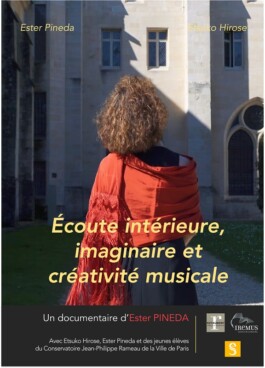


12 octobre 2022
Un Film de vulgarisation scientifique sur le cerveau créatif des musiciens et la pédagogie de la musique sera diffusé à l’occasion de la Fête de la science 2022, les 15 et 16 octobre prochains. "Écoute intérieure, imaginaire et créativité musicale" est un court-métrage documentaire d’Ester Pineda, membre du conseil scientifique du Centre Européen de Musique.

Sur le fil conducteur de la musique, ce court-métrage de vulgarisation scientifique aborde la recherche en neuropsychologie cognitive de la musique dans une approche originale de l'imaginaire musical et de l'écoute intérieure des pianistes dans l’interprétation et la pédagogie de la musique. « Pendant ma thèse doctorale j’avais participé à un concours de réalisateurs et puisque le cinéma est un de mes domaines artistiques de prédilection j’ai souhaité faire des actions de vulgarisation sous cette forme. Mon côté curieux et ludique ! », explique Ester Pineda qui avait obtenu le premier prix à l’époque du concours.
Écoute intérieure, imaginaire et créativité musicale, le nouveau documentaire d'Ester Pineda sera également diffusé en avant-première sur YouTube.
Membre du conseil scientifique du Centre Européen de Musique, Ester Pineda est pianiste, professeure d’enseignements artistiques au Conservatoire Jean-Philippe Rameau (Paris) et docteure en musicologie systématique (Sorbonne Université - Université de Caen). Son engagement dans la pédagogie l’a conduite à s’investir dans la recherche en neuropsychologie de la musique s’intéressant à l’activité cérébrale dans l’apprentissage et l’interprétation musicale. À la croisée de la musicologie et de la psychologie cognitive, ses travaux portent sur l’exploration des processus cognitifs liés à l’audition intérieure et notamment, sur les processus mnésiques (tout ce qui concerne la mémoire, ou des moyens facilitant la conservation des souvenirs) en fonction du type d’écriture musicale. Ester Pineda a également participé au premier colloque international du Centre Européen de Musique.
« La pratique et l’interprétation musicale impliquent des processus hautement complexes qui font appel aux capacités cognitives de l’être humain dans leur globalité. Peu de travaux scientifiques abordent l’expérience musicale dans une approche intégrative et notamment, la façon dont la musique elle-même (style, structure) détermine les stratégies cognitives mises en œuvre par le musicien dans l’acte de transmission. Éminemment multimodales sur le plan cognitif, les représentations mentales internes de la musique (visuelles, motrices, auditives, perceptives, etc.) constituent les différentes composantes de l'audition intérieure et sont indissociables du rôle central du corps dans l’incarnation de la musique.» Une présentation de la pianiste, pédagogue et musicologue, Ester Pineda, donnée à l'occasion du colloque international et transdisciplinaire du Centre Européen de Musique ''De la musique avant toute chose / Music before all else'' (14 novembre 2020).
12 octobre 2022
Un Film de vulgarisation scientifique sur le cerveau créatif des musiciens et la pédagogie de la musique sera diffusé à l’occasion de la Fête de la science 2022, les 15 et 16 octobre prochains. "Écoute intérieure, imaginaire et créativité musicale" est un court-métrage documentaire d’Ester Pineda, membre du conseil scientifique du Centre Européen de Musique.

Sur le fil conducteur de la musique, ce court-métrage de vulgarisation scientifique aborde la recherche en neuropsychologie cognitive de la musique dans une approche originale de l'imaginaire musical et de l'écoute intérieure des pianistes dans l’interprétation et la pédagogie de la musique. « Pendant ma thèse doctorale j’avais participé à un concours de réalisateurs et puisque le cinéma est un de mes domaines artistiques de prédilection j’ai souhaité faire des actions de vulgarisation sous cette forme. Mon côté curieux et ludique ! », explique Ester Pineda qui avait obtenu le premier prix à l’époque du concours.
Écoute intérieure, imaginaire et créativité musicale, le nouveau documentaire d'Ester Pineda sera également diffusé en avant-première sur YouTube.
Membre du conseil scientifique du Centre Européen de Musique, Ester Pineda est pianiste, professeure d’enseignements artistiques au Conservatoire Jean-Philippe Rameau (Paris) et docteure en musicologie systématique (Sorbonne Université - Université de Caen). Son engagement dans la pédagogie l’a conduite à s’investir dans la recherche en neuropsychologie de la musique s’intéressant à l’activité cérébrale dans l’apprentissage et l’interprétation musicale. À la croisée de la musicologie et de la psychologie cognitive, ses travaux portent sur l’exploration des processus cognitifs liés à l’audition intérieure et notamment, sur les processus mnésiques (tout ce qui concerne la mémoire, ou des moyens facilitant la conservation des souvenirs) en fonction du type d’écriture musicale. Ester Pineda a également participé au premier colloque international du Centre Européen de Musique.
« La pratique et l’interprétation musicale impliquent des processus hautement complexes qui font appel aux capacités cognitives de l’être humain dans leur globalité. Peu de travaux scientifiques abordent l’expérience musicale dans une approche intégrative et notamment, la façon dont la musique elle-même (style, structure) détermine les stratégies cognitives mises en œuvre par le musicien dans l’acte de transmission. Éminemment multimodales sur le plan cognitif, les représentations mentales internes de la musique (visuelles, motrices, auditives, perceptives, etc.) constituent les différentes composantes de l'audition intérieure et sont indissociables du rôle central du corps dans l’incarnation de la musique.» Une présentation de la pianiste, pédagogue et musicologue, Ester Pineda, donnée à l'occasion du colloque international et transdisciplinaire du Centre Européen de Musique ''De la musique avant toute chose / Music before all else'' (14 novembre 2020).
